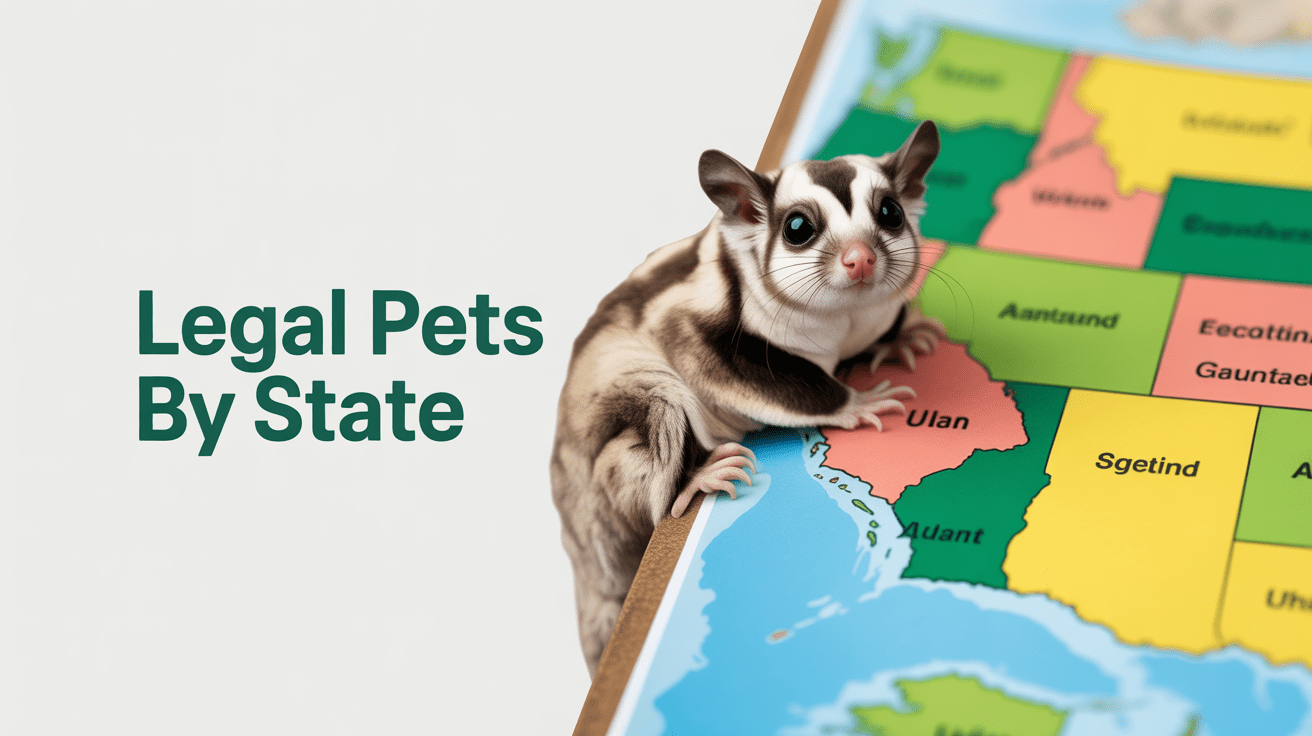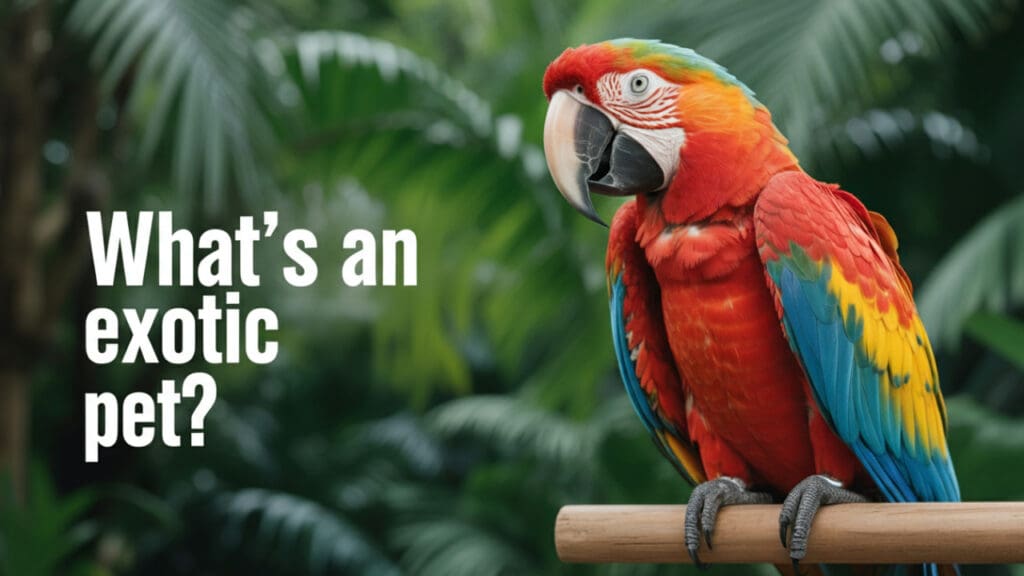
Newsletter Subscribe
Enter your email address below and subscribe to our newsletter

Enter your email address below and subscribe to our newsletter

They look so adorable. You keep scrolling and seeing these animals on your phone: a hedgehog, a sugar glider, and even a capybara.
But is it legal to own one in the state where you live? What are some of the legal exotic pets in the U.S.? And what are the things you need to watch out for?
First, you should know that owning an exotic pet in the U.S. is about navigating regulations and permits that differ from state to state. The responsibilities you need to uphold are also dependent on these restrictions.
You can most certainly own an exotic pet in most cases. However, that is only if you follow highly specific laws that are meant to protect both the people and the animals.
Some exotic pets, like servals and wallabies, are legal in states like Texas. But you should not attempt to get one of these in California, as they are banned.
You may be one of those who don’t realize that local municipalities can override state approvals. And this could at times lead to fines, and in one of the worst cases, animal seizures.
Also, make no mistake. Animals like sugar gliders and hedgehogs may be often marketed as beginner-friendly. However, experts warn that they need complex care routines. And to top that, the long-term costs of caring for these animals can exceed $1,000 per year.
So, take the time to go through this piece. You’ll learn which species require USDA permits. We’ll also discuss why axolotls (an internet sensation) are banned in just a few states. And you’ll see how the cost of exotic vet care can be two to five times more than the rate of traditional pet care.
In February 2025, the U.S. Fish and Wildlife Service moved exotic pet travel permits online. This change has made international travel with exotic pets more convenient for owners. At the same time, several states, including Pennsylvania, are reviewing domestic violence protection laws to include pets, highlighting the growing recognition of animals as part of family safety. The Big Cat Public Safety Act also continues to reshape ownership in the U.S. Only seventeen private owners registered their big cats by the June 2023 deadline, which has significantly reduced the number of privately kept big cats.
It’s important to remember that laws and regulations around exotic pets are always changing. Before deciding to acquire one, you should always check with your state’s wildlife agency to confirm the most current rules.

The term “exotic pet” doesn’t just refer to animals like lions, tigers, or monkeys. The legal definition of the term is a lot more nuanced.
In the United States, an exotic pet is typically any animal that’s not commonly domesticated or native to the region. So, this includes everything from cute animals like hedgehogs to mysterious ones like tarantulas.
In legal context, however, the definition isn’t standardized. It often depends on which state you live in and what local regulations oversee this. These regulations classify animals based on their potential risk to public safety, impact on the environment, and animal welfare.
Some federal agencies, like the U.S. Department of Agriculture (USDA) and the Fish and Wildlife Service, do provide us with guidance. And this is especially the case for species or animals that are protected under CITES (the Convention on International Trade in Endangered Species).
That said, note that each U.S. state and local government (not the federal government) is responsible for making sure that the rules are enforced. They are also the ones that would issue licenses to exotic pet owners like us.
Remember, you should not make the mistake of thinking that any animal sold in a pet store is legal to own. Some may just be legal in a few states, but not in others. For instance, laws regarding domestic ferrets are quite varied from state to state.
Exotic animal specialists say that “legality” can also depend on whether the animal has been bred in captivity or imported. If the animal is captive-bred, you’d usually face fewer legal barriers. That is not the case for wild-caught animals. These often need federal permits or face outright bans. So, you should do your research before getting yourself an exotic pet.

Have you fallen in love with the kinkajou or even the serval you came across online? Let’s take a moment to understand the complex (and most likely contradictory) law across the United States first.
At the federal level, we have agencies like the U.S. Department of Agriculture (USDA), Centers for Disease Control and Prevention (CDC), and the U.S. Fish and Wildlife Service (USFWS). They help oversee aspects of owning an exotic pet to some extent.
For example, the USDA regulates commercial breeders. The CDC would restrict certain species (like monkeys and African rodents) if they pose risks like zoonotic disease. And the USFWS enforces international trade laws under CITES. But you should know that they do not deal with private pet ownership directly.
State laws are the real gatekeepers here. Some states, like Texas and Nevada, legalize owning a wide range of exotic animals. However, states like California and Hawaii are so strict that they ban even some common exotics like ferrets. Some other states, on the other hand, would allow ownership, but there’s a need for specific licenses, inspections, or microchipping.
You should avoid buying a pet online just because they are available. Know that if you illegally own an animal, the fine could exceed $5,000. And in some cases, your little pet may even be taken away without compensation.
John Martinez, Director of the Texas Wildlife Sanctuary, has an important warning for potential exotic pet owners. He explains that the sanctuary receives dozens of surrendered sulcata tortoises every year. Many people buy them as cute, two-inch babies without realizing what they’re committing to. These tortoises can live for more than 70 years, grow to over 100 pounds, and require a yard as large as a small park. In many cases, they outlive their original owners. Rehoming them is also costly- the process can exceed $2,000 for a single animal.

The exotic pet laws in America are different by state but can be wildly contradictory. If you look at states like Nevada, North Carolina, and Alabama, you’ll find that owning most exotic animals is permitted. And sometimes there’s little to no regulation imposed.
However, states like California, Hawaii, and New York take this much more seriously. They have the strictest laws that ban almost all non-traditional pets out of concern for the environment and safety of the people. This means even hedgehogs and sugar gliders are off-limits.
Some other states are in the middle ground. And these include Florida, Pennsylvania, and Illinois. You can legally own certain exotic pets in these states, but you’ll need things like permits, annual renewals, or sometimes even proof of proper housing and care for the animal.
Note that laws in these states are usually enforced by wildlife or agricultural departments. And there are application fees that can range from $50 to over $300. The amount will be based on the species of animal you own and their risk classification.
You should remember to check local ordinances after reviewing the state laws. At times, having state-level clearance is not enough. You’ll need to consider county or city-level bans as well. Legal experts say that municipal restrictions are often more conservative. Yet, they are less publicly known. So, you’ll need to put in the extra effort and do your research.
Are you one of those people who’d love to have legal exotic pets for their novelty, and perhaps for their intelligence and charm, too? You’ll need to choose one that strikes a balance among legality, the requirements for taking care of the pet, and their compatibility with your home life.
Let’s start with some popular options. Hedgehogs are the top pick for most of us that live in small spaces; however, they are banned in several states. Hedgehogs need minimal grooming, and they cost about $100-$300, depending on the breeder.
Next, there are sugar gliders. These pets are social, engaging, and you can never doubt how adorable they are. But remember that sugar gliders need vertical space. And this means there’ll be a higher upfront cost in order to set up their habitat. Also be aware that sugar gliders are illegal in Alaska, California, and Hawaii. Georgia requires proof of a USDA-inspected breeding source, New Mexico requires an exotic pet permit, and New York has sugar glider bans in the five burroughs, so you need to do your research before adopting one.
Moving on, we have the “smiling salamanders” known as axolotls. These creatures are legal in most states (with a few exceptions like California, New Jersey, Maine, and Washington D.C.). And you should be aware that Hawaii and New Mexico require permits to own axolotls. They are relatively low-maintenance and aquatic. They do well in cool freshwater tanks. And if you take care of them properly, axolotls can actually live over 10 years. That said, you should remember to get the right filtration system. Don’t cut corners.
If you’re looking for a flying companion, perhaps consider parrots and cockatiels. These animals are smart. They live a long life, and they are legal in all 50 states. But note that they’ll need mental stimulation and social interaction. These feathered pets can also be quite noisy, so be warned. Also, they can live up to 40-60 years, so there’s real commitment there.
Take your time and think carefully. Review the laws, evaluate your lifestyle, and budget wisely. You want to choose the best legal exotic pets that will not burden you too much down the line.
Is having a python or serval cat in the house even ethical or safe? Should exotic pets be legal? This probably isn’t a black-and-white situation. There are too many perspectives to consider based on science, safety, and morality.
Those in support of legal exotic pet ownership say that responsible ownership is possible and becoming more common. They argue that these animals pose little threats, especially when sourced from ethical breeders and raised in the right environments. Some experts also say that certain species, like sugar gliders and parrots, do thrive under human care, provided that they are properly taken care of.
On the other side of the spectrum, opponents are worried about the bigger picture. Groups like the Humane Society and Born Free USA argue that owners usually underestimate the animals’ long-term needs and stress levels. They say that cost is what throws most people off. After all, vet care for exotic pets can be three to five times more expensive than standard care for a typical pet.
Wildlife rehab professionals state that people often assume that love and attention can override instinct. That’s not true. Your exotic pets may still bite, scratch, or feel stressed out if you do not provide the needed resources for them to thrive. Some may even carry zoonotic diseases.
Owning a legal exotic pet in the U.S. is quite a trip through the maze. You’ll find yourself having to get around obtaining permits, licenses, and registration. Remember, you do not want to face fines, confiscation, or even criminal charges later down the road.
A lot of states that allow exotic pet ownership will require a special wildlife permit or even an exotic animal license. These will detail general conditions like housing, safety barriers, and vet access. Additionally, there will be care standards that are tied to the specific species.
For example, if you’re living in Florida, you’ll need a Class III Wildlife Permit for owning animals like skunks, lemurs, and small monkeys. The application must include pictures of the enclosures. You’ll also need to provide some proof of your experience in handling the animal and your contingency plans for when/if your pet does escape.
Now, local ordinances are another layer of trouble you’ll need to get by. You’ll likely need additional pet registration for this with animal control or city authorities. Registration can run from $25 to over $100 per year. Do not overlook this step, or you might face consequences otherwise.
Getting a permit for owning or keeping certain animals can feel complicated, but breaking it down step by step makes it easier.
The first thing you need to do is figure out which department handles wildlife permits in your state. For example:
Each state has its own form. A few examples:
When filling out your application, you’ll usually need:
Once you have everything ready, submit your application with the fee.
Before approval, officials will visit your property to check things like:
Once you’re approved, you’ll receive your permit. Keep in mind:
One of the biggest misconceptions surrounding legal exotic pets in America is that legality equals safety. That’s not entirely true. If the animal is legal to own, it means it’s passed the strict regulations in place in that state, but this has got little to do with your personal safety.
Venomous snakes and large primates, for example, can be legal to own in some states if you go through the proper procedures. However, what happens afterwards is your responsibility. Your snake may pose significant danger to you, your neighbours, and even the local ecosystems if you do not take good care of them.
Veterinary toxicologists say that a lot of people underestimate the physical strength, diets, and aggression of such exotic animals.
Also, many of us believe that exotic pets are only for the rich to own. It’s true that some exotic animals, like capuchin monkeys and servals, can be quite expensive upfront (about $5,000 to over $20,000). But there are others, like hedgehogs or geckos, which are quite affordable.
That said, the real expense is actually in the long-term care. You’ll need specialty enclosures, exotic vet services, and diets catered to a specific species. You can expect all these to add up to thousands of dollars per year.
Another harmful assumption is that loving care alone can domesticate a wild species. Experts warn that instincts are unpredictable. Even if you bottle-feed or hand-raise an exotic pet since young, they may still bite or harm you. This is one of the reasons critics raised the question, “Should owning exotic pets be illegal?”
Should you choose a macaw or a tegu? Preparedness is what you need to choose from many exotic pets that are legal in the U.S. You need to be ready to address your pet’s unique needs and the legal hurdles that come with them as well.
To begin with, do some research as to which exotic pets are legal in your state and municipality. Don’t think that all animals shown on YouTube can be brought to your house without a problem.
Next, you should seriously think about the animal’s long-term care requirements and budget. For instance, reptiles like ball pythons may cost you less than $100 initially. But the setup, including the right enclosure (plus upgrades), heating systems, and UV lighting, can easily exceed $500-$1,000.
Birds like African greys can live over 40 years. And they need stimulation on a daily basis to avoid being stressed out. So, it can be quite the commitment. Exotic animal vets even mention that owners often surrender their exotic pets because they underestimate the lifespan of these animals and the complexity of care needed.
Besides that, you’ll need to consider how the pet could align with your lifestyle. Do you travel much? Do you have kids and other animals at home? Are you able to drive hours to see an exotic vet if there’s none nearby?
Lastly, always ask the seller for legal documentation and vet history. Make sure you purchase your pet from a trustworthy breeder. And they should be able to provide you with things like the pet’s proof of captive breeding, their health records, and other details about their diet and environment.
You’re probably still confused about the state laws and perhaps wondering about some ethical debates. We’ve gathered some of the most frequently asked questions about exotic pets in the U.S. to help clear that doubt of yours.
Some of these include capybaras, wallabies, and fennec foxes. You’ll need to be careful, however, as their legality varies by state. Most of the time, owning these animals requires permits or inspections.
Many people think that sugar gliders, hedgehogs, and pygmy marmosets are really cute. They are tiny, quite sociable, and expressive.
Standard house animals like dogs, cats, and rabbits are not considered exotic. They are species that are widely accepted and regulated under traditional pet laws.
In the most general sense, exotic pets are non-native and traditionally non-domesticated species. Such animals include reptiles, amphibians, wild mammals, and certain birds.
Each state has its own rules. Some states allow a wide range of exotic animals with minimal regulation. Other states may have strict bans, and some will require extensive permitting.
Some animals are banned to prevent invasive species outbreaks. Others can be banned because of public health risks due to the potential diseases they might carry.
You can legally own a monkey in certain states, like Florida and Texas, with a permit. However, a lot of states ban primates entirely. It’s mostly because of health concerns.
Yes. Most exotic pets need a state-issued permit or local registration. Some jurisdictions also require annual renewals and veterinary documentation.
You may find behavioral issues with exotic pets. And they need specialized care. Also, some animals may carry zoonotic diseases.
You can start by checking your state’s wildlife or agricultural department website. Better yet, call your local animal control office to make sure that you get the updated information regarding the regulations.
Remember, the issue surrounding legality is shaped by your state and local laws. You’ll sometimes need a permit to own your pet friend in one state, but not in another state.
Other than legal concerns, you’ll need to take care of the specific needs of your chosen animal. Budget and don’t overlook costs. These include the exotic vet care and specialized enclosures needed for your pet to live a healthy life.
Do more research if you need to. Don’t rush into things. Gather more expert insights, real-world examples, and even consider the ethical debates surrounding your animal choice.
If you’re still feeling inspired to get yourself that hedgehog or axolotl, start looking up local regulations. Take careful steps to find your dream pet, and you’re sure to be a great pet parent.
Is there an exotic animal you wish you could legally own? Why do you like this animal? Let us know in the comments down below!